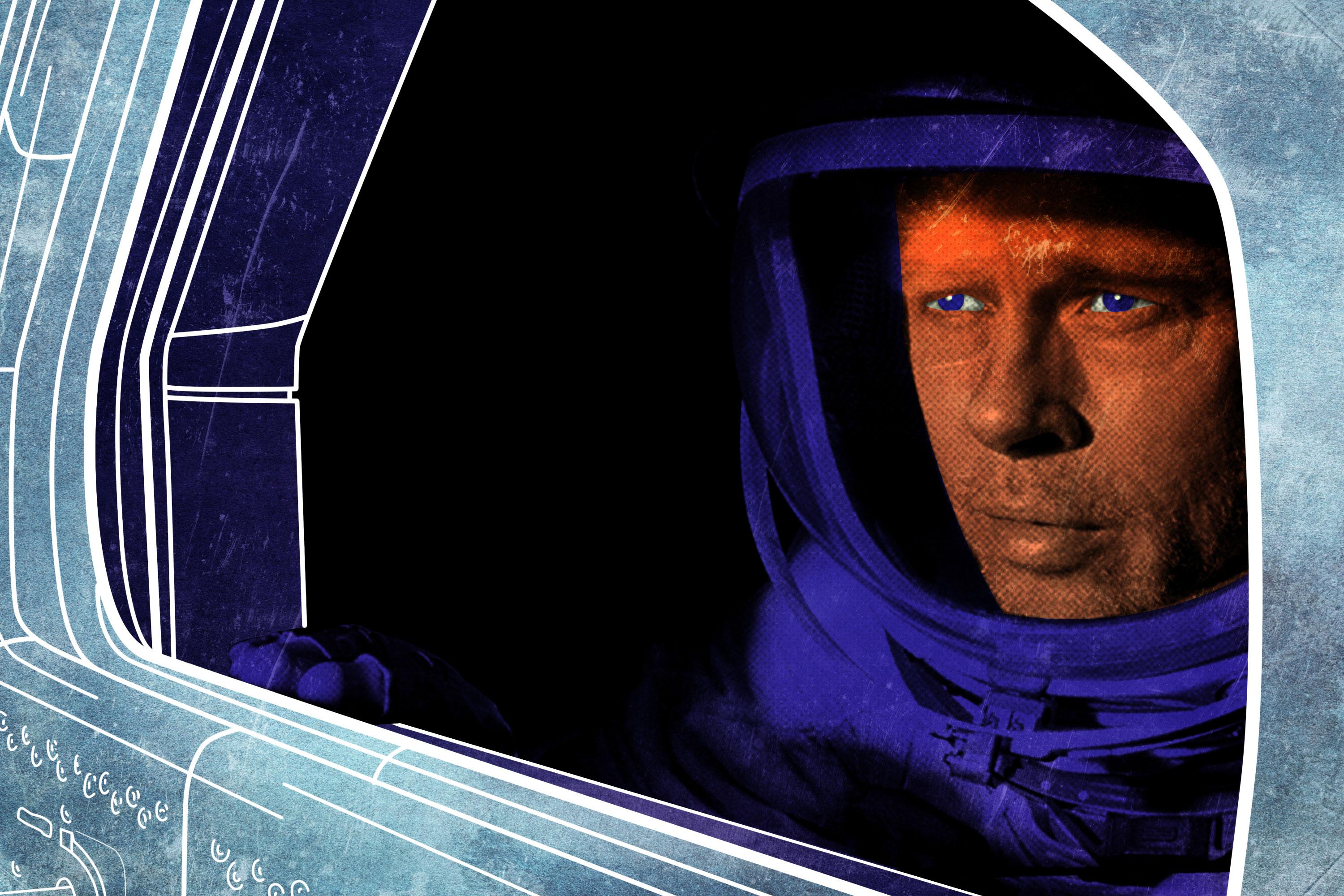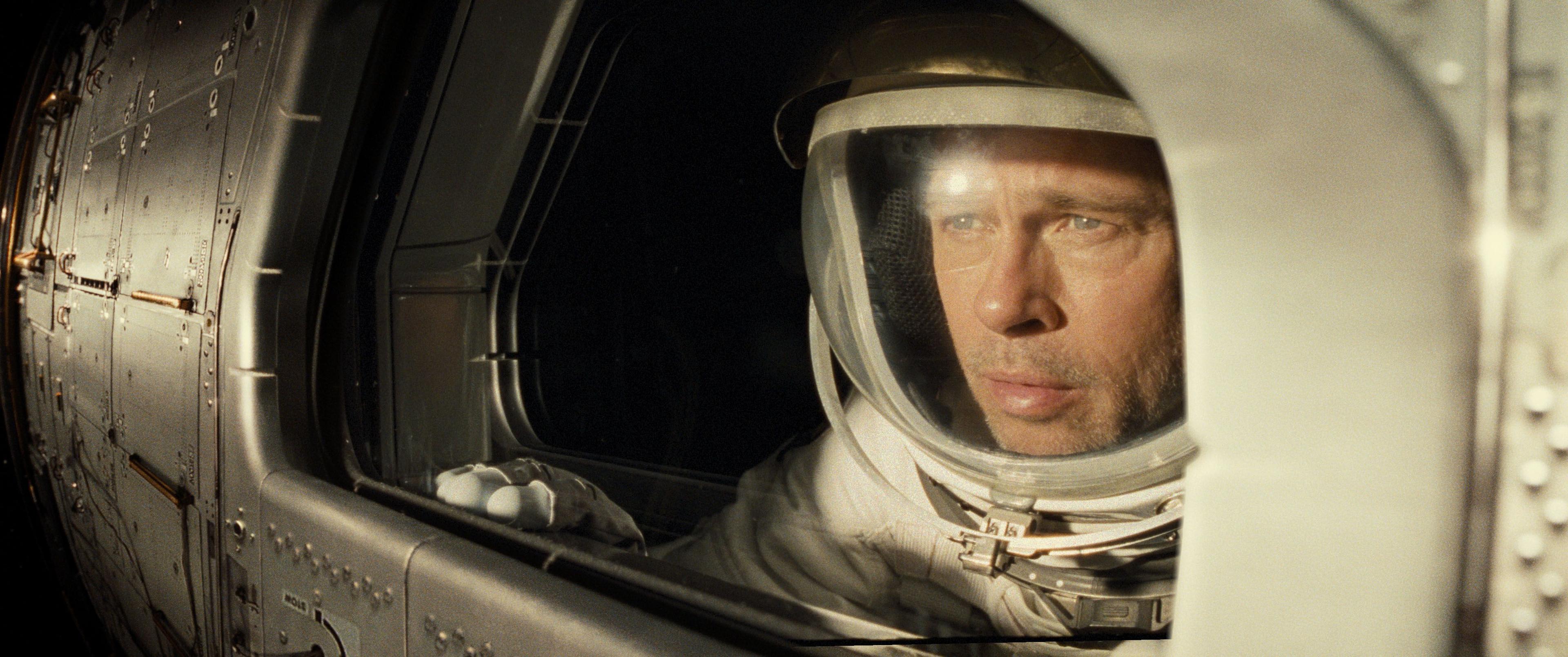
Brad Pitt went to space. That’s it. That’s the summary of Ad Astra. OK, obviously there’s more to it; like A LOT more—daddy issues, killer monkeys, an in-distress Liv Tyler, a bunch of fuzzy space science—but I’m just trying to be brief because the Ringer staff had plenty of thoughts on James Gray’s latest movie.
1. What is your tweet-length review of Ad Astra?
Ben Lindbergh: In space, no one can see you smile.
Jason Concepcion: 2019: Space Therapy
Kate Knibbs: I award this film five Hudson News stands on the moon out of five Hudson News stands on the moon!
Michael Baumann: Neptune is a long way to go for closure, even more so when the path is beset on all sides by a number of unnecessary—if exciting and beautiful—side quests.
Cory McConnell: “God is dead, and we have killed him.”

With apologies to Under the Silver Lake, this is the best film of the year.
Alison Herman: I enjoyed Ad Astra more as the latest chapter in Brad Pitt’s meta-narrative than as a piece of storytelling. But I did enjoy it!
Amelia Wedemeyer: Ad Astra is Brad Pitt’s Sully.
2. What was the best moment of the movie?
Concepcion: The lunar-buggy chase! Let me get this straight: In the not-too-distant-future, there are moon pirates—pirates ON THE MOON—and somehow that’s not the movie?
Lindbergh: I’m still not sure why the crack escort team that was supposed to protect Roy from lunar pirates was so surprised and unprepared when the pirates appeared—plus, where would pirates hide on a lifeless rock, and what would they get out of attacking this convoy?—but the chase scene looked cool, at least. I liked this movie more for the solar system sightseeing than the themes or the plot.
Wedemeyer: I enjoyed the movie as a whole, so rather than the “best moment,” I’m going to say that the film’s wildest moment was the ape attack. That was absolutely unexpected. People in my theater were literally guffawing, myself included.
Knibbs: The Hudson News stand on the moon.
Surrey: When the insular Roy confronts his father, Clifford “Colonel Kurtz” McBride, and finally displays the love and empathy he’d tried to close himself off from his whole life. (Toxic masculinity is bad, especially when the fate of mankind is at stake!)
McConnell: The father-son reunion, which is loaded with subtext and emotion and makes the strongest case for the film’s humanist thesis. It also quietly contains the most interesting idea that the film presents: the Lima Project’s discovery that we are almost assuredly alone in the universe, and the subsequent psychological effects of that revelation.
Baumann: Maybe this makes me a sap but I felt genuine pathos at the very end, with Roy’s last psych eval. I found myself caring less about whether Roy found his father than whether he found peace, and it was such a sigh of relief when he did.
Herman: Is “Brad Pitt” an acceptable answer to this question?

3. What was your least favorite part of the film?
Lindbergh: Roy’s Colonel Kurtz father repeatedly telling his son, “You have to let me go.” As in, literally let go of the tether keeping him from floating free in space, but, you know, also psychologically. Lines like that, along with Roy’s lugubrious, over-explaining voice-over (“In the end, the son suffers from the sins of the father”) and the Dear John videos from veteran, long-suffering astronaut’s wife Liv Tyler made the father-son stuff as subtle as a murderous monkey.
Wedemeyer: There were some parts when I couldn’t understand what Tommy Lee Jones was saying?
Surrey: It’s so cold to cast Liv Tyler in yet another thankless role as the astronaut’s wife—though James Gray makes up for it by having Natasha Lyonne spontaneously show up (as herself?) on Mars.
Knibbs: I found that the concept of nuking oneself from Neptune to Earth and landing with no significant injuries stretched the limits of my credulity.
Herman: My entire theater started laughing when Brad asked himself “What have I done?!” while plaintively staring into (literal) space. Ad Astra isn’t afraid to be earnest, but sometimes the unrelenting seriousness overplays its hand.
Baumann: I think this movie would’ve been 35 percent better if they’d found a way to write around the voice-over.
McConnell: The constant use of voice-over is rough. It takes away from Pitt’s otherwise laconic, introspective performance and took me out of some scenes by over-explaining plot points and hammering so, so hard on the film’s religious themes. It’s reminiscent of the half-hearted and unnecessary VO throughout some versions of Blade Runner, which Harrison Ford was vocal about hating.
Concepcion: That it took a treacherous journey to the edge of the solar system, murderous space baboons, and an accidental triple-homicide for Major McBride to realize he needed to reassess his work-life balance.
4. Pick a Brad: Roy McBride or Cliff Booth
McConnell: Early in Ad Astra, Roy McBride tells us how he puts on a facade to be able to interact with other people. In Once Upon a Time … in Hollywood, Cliff’s slamming beers on a roof, cruising around L.A., reminiscing about fighting Bruce Lee. I’ll hang with Cliff.
Lindbergh: It’s a testament to Pitt’s skill that he can convincingly play a character who emotes mostly via slight twitches of the bags beneath his eyes, but charisma is Pitt’s superpower. I want to watch him use it.
Baumann: I’m really not trying to be a buzzkill but Cliff, while extremely cool, did murder his wife, and it was played for laughs.
Concepcion: Cliff Booth is a vastly better hang than Roy McBride. And he can fix your television.
Knibbs: He’s more fun as Cliff, but he’s less wife-murdery as Roy. So it’s a toss-up?
Herman: Ripped, unfazed, and effortlessly cool, Cliff is who I want to be—minus the, uh, wife stuff; depressed, bitter, and knee-deep in denial, Roy is who I actually am. One is Movie Star Brad; the other is Actor Brad. I love both, but as a jaded millennial who watches BoJack Horseman, I gotta go with Roy.
Wedemeyer: Tough choice. It’s interesting that both Roy and Cliff occupy a certain aspect of toxic masculinity, with Roy being emotionally distant and Cliff being excessively violent. Yet, even as we continuously see their negative traits throughout each film, we’re drawn to them, and that’s a testament to Brad Pitt’s skills as an actor. So to make a long statement shorter, I’m going to say both, because Brad has made it impossible to choose.
Surrey: I pick the Brad who called Phantom Thread “delicious.”
5. What does Ad Astra get right about the near future?
Lindbergh: Chain restaurants are coming to Tycho crater.
Concepcion: There will absolutely be an Applebee’s on the moon.
Wedemeyer: James Gray and Co. are on to something with those calming rooms. We already have nap pods, which means the next step in self-care is obviously a room that projects nature scenes on its walls.
Baumann: Very little, actually. The Lima Project and International Space Antenna represent a U.S. government commitment to pure scientific space research I can’t imagine ever happening again. That’s to say nothing of the fact that in order to live long enough to build such things we have to stave off civilization-threatening climate change, which probably ain’t gonna happen either. I guess Brad Pitt will still be hot in the future. That’s something.
McConnell: Human nature’s effect on space exploration. The Lima crew makes it to the outer edges of the solar system only to mutiny after staring into the lifeless void. We see the effects that isolation and a religious-like commitment to finding meaning or validation from beyond has had on Roy’s father. As Roy says near the end of the film, “We’re all we’ve got,” and that, more than any of the featured technology, is what’s predictive to me. Tech advances in the near future may give rise to space expeditions and habitats like the ones seen in Ad Astra, but the film asserts that what will define those endeavors is our messy, complicated human nature. That’s not going anywhere.
Surrey: We would commercialize the moon in a heartbeat. (And for a more futuristic and equally cynical look at what humanity would do if space travel became routine, I recommend checking out The Expanse.)
Herman: Hudson News is our one universal constant. It will outlive us all.
6. Which secondary character in Ad Astra do you want to know more about?
Lindbergh: In a movie with so little levity and next to no facial-muscle movement, the single scene featuring Tanya Pincus (Natasha Lyonne) as a Mars customs officer with a New York accent was like an emergency oxygen tank in a vacuum. I smell a spinoff.
Surrey: Seriously, why is Natasha Lyonne on Mars?
McConnell: Ruth Negga’s character, Helen Lantos, appears for very little of the movie, but what backstory we get from her is fascinating. If there’s ever an Ad Astra ECU, that character is who I’d want to see more of.
Concepcion: It was almost comical how little Eve McBride (Liv Tyler) is in this movie. Sad Wife is not a personality.
Baumann: When Lieutenant Stanford showed up on screen I nearly leapt out of my seat and shouted, “IS THAT LOREN DEAN, WHO’S BEEN IN LIKE FOUR THINGS, THREE OF WHICH ARE ABOUT SPACE?” I’m not really that curious about the character, I’m just thrilled that Ad Astra reunited half the crew of the space shuttle from Space Cowboys.
Wedemeyer: I’d love to get a spinoff miniseries about the moon pirates, preferably on Apple TV+.
Herman: In case James Gray is taking ideas for DVD extras: I would like Ruth Negga to guide me on an Architectural Digest–style home tour of the Mars station.
7. What is your one science-related beef with this movie?
Concepcion: Why did Space Command need Roy McBride to hand deliver a nuke in order to blow up Project Lima? They couldn’t, like, launch a bunch of missiles from a safe distance?
McConnell: Roy gets to Neptune very fast! It took Voyager II about 12 years to get that far out, and it appears to take Roy … significantly less time than that. The film is purposefully vague about how fast their spacecraft are traveling, hiding behind the “near future” caveat, but it’s a pretty big leap.
Knibbs: Where to begin … hmm … I suppose with the concept of nuking oneself from Neptune to Earth and landing with no significant injuries.
Surrey: There are so many variables that would’ve prevented Roy from getting back to his ship—and then he blew up the Lima Project, which provided enough momentum for him to make it back to Earth.
Herman: Roy floating underwater while sermonizing about life didn’t need any explanation besides “it looks cool,” but he should at least look kinda soaked afterward, right?
Baumann: The most glaring one is everyone on the moon and Mars walks normally despite being in reduced gravity, but I would genuinely like to hear from a physicist on whether a nuclear explosion would neutralize antimatter, because while I’m not an expert, I’m pretty sure that’s not how antimatter works.
Lindbergh: I minded the movie’s anti-science sentiment more so than its specific scientific inaccuracies (although there were plenty of those). In The Martian, for one, science is something that brings us together, but in Ad Astra, it’s something that isolates us (and inevitably leads to monster monkeys and a taste for floating-corpse decor). My Latin is pretty rusty, but the movie’s message seemed less like “Through adversity to the stars” than “To adversity through the stars.” Sure, maybe there’s more life when we look around us than when we look up, but can’t we do both?

8. Do you believe there’s intelligent life in outer space?
Concepcion: Yes.
Knibbs: Yes. Let’s see them aliens.
Lindbergh: I’m as certain as H. Clifford McBride that intelligent ETs exist, although I doubt they’ve ever visited us and I’m not sure we’ll ever make contact.
Herman: I don’t think the personification of paternal neglect counts as “intelligent” life, but it’s definitely life!
Surrey: It’s shortsighted to believe we’re the only intelligent life in the universe, even if—to quote Ad Astra’s tagline—the answers we seek are just outside our reach.
Wedemeyer: Yes, of course.
Baumann: Yes. Space is so big that even something as complex as an intelligent brain has a high probability of evolving in multiple ways in multiple places. Shout-out Frank Drake.
McConnell: Have you seen the classified UFO videos the guy from Blink-182 leaked? Aliens Exist, dude.
9. Before signing off, please submit a psych eval.
Baumann:
Me: I’m feeling—
Computer: Don’t bother, I know where this is going, and we’re never going to send you to space.
Herman: “Time to hand out the mood stabilizers!” —That one astronaut, and also me after seeing this movie.
Lindbergh: I can almost guarantee that my resting heart rate never rose above 80 while I was watching this movie.
Wedemeyer: I like the concept ... in theory.
Concepcion: I still believe in my mission. I’m eager to get started.
McConnell: I am happy, I am well rested, I am calling you from this Frank Ocean concert, I am enjoying the concert, submit.
Knibbs: I did not see that face-eating monkey coming, and it haunts my dreams!

